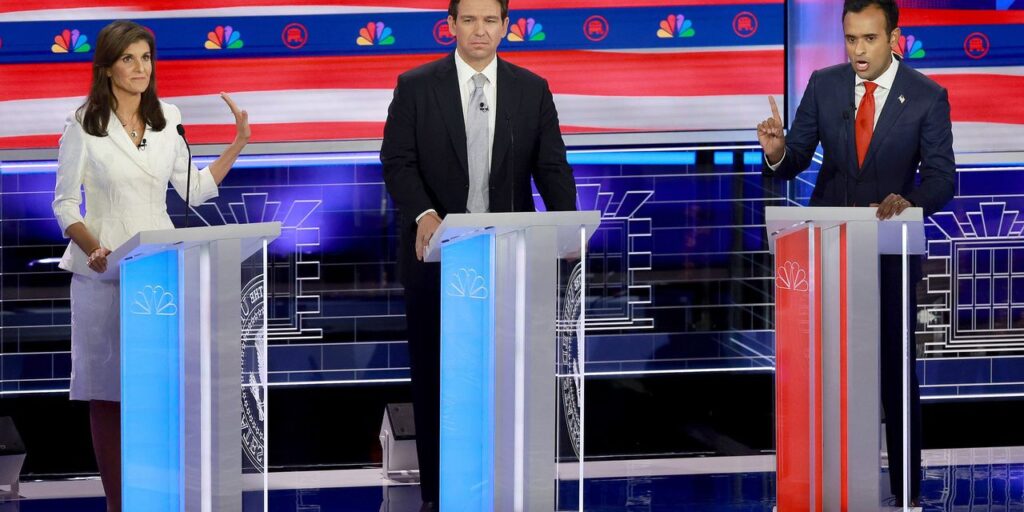With two months before the Iowa caucuses and three months before the New Hampshire primary, there’s now a real race for the Republican presidential nomination. The field is winnowing to two alternatives to former U.S. president Donald Trump: former U.N. Ambassador Nikki Haley and Florida Gov. Ron DeSantis.
The bad news: So far, no candidate feels forced to address convincingly and specifically the financial markets’ growing concerns about rising and unsustainable U.S. debt, deficits and fiscal spending. In fairness, this is due to the highest geopolitical risk in 50 years: as a result, the debate became a de facto foreign policy and defense debate.
The rapidly shrinking Republican presidential field is markets-positive for the many who want a not-Trump Republican nominee alternative to U.S. President Joe Biden.
It’s now a top-tier of two, Haley and DeSantis, who are continuing to separate from the rest of the field thanks to another strong debate performance Wednesday by Haley and a competent one by DeSantis, in which he made no mistakes but didn’t excel, either. This has happened quickly: two months ago the field was seven or more, and hadn’t clarified.
The Republican POTUS nomination race isn’t moot, and it isn’t over. Here’s why:
- Trump underperforming expectations in Iowa and/or New Hampshire would have almost the same negative impact on Trump as a loss because it would shatter his “invincible” narrative. Today, that’s the direction in which things are starting to trend, and we’re still months away from voters’ decisions.
- Forget Trump’s lead in meaningless national beauty contest polls: a presidential candidate is never nominated or elected on the basis of simple national popularity.
- In the early primary states, Trump’s lead is 10- to 12 points less than national. This means 50% to 60% of early Republican primary voters already don’t want Trump. Plus, more than one-third (37%) of Trump support in Iowa is soft, with voters saying they “could still be persuaded to pick another candidate” (Des Moines Register, 10/30/23).
- DeSantis and Haley together have one-third of voter support in the same poll, and their support has been increasing.
- If, in mid-January, Trump leaves Iowa with percentage support in the 30s, and there are two other candidates that singly or together have equal or greater support, the 2024 race starts to get rewritten with a markets upside surprise: shedding Trump unpredictability alone would be a markets plus.
“As Trump’s legal travails continue, so will voters’ rising interest in alternatives who can win the November 2024 general election. ”
Forget also the current “Republican election losing streak” analysis from those whose political field research is little more than crossing the river from Washington, D.C. to Virginia for dinner.
Tuesday’s few single-issue elections mirrored where the country as a whole is on abortion access, and so isn’t a surprise, even if it’s being hyped as one. And this isn’t a legislative game changer. The ballyhooed Virginia legislative elections are instructive. The legislature already was closely split. Democrats lost a Senate seat but gained a few in the lower house for a tenuous majority of one in each house, based upon a few thousand votes out of nearly 2 million cast.
Abortion access is being won, as voters want. But now Democrats will be squeezed on restrictions, which the public also wants and which Democrats won’t be able to keep ducking. So abortion still has the ability to bite Democrats if they don’t get serious and specific about restrictions.
For national elections, by far the most important to voters now is the economy and security, from the U.S. border to foreign policy. Those and other top-tier issues are top of voters’ minds in making Biden unpopular.
Republicans can fumble away the opportunity to topple Biden. But, right now, the presidential nomination race, and the issues upon which it will be fought, is notably different from 2016: as Trump’s legal travails continue, so will voters’ rising interest in alternatives who can win the November 2024 general election.
Markets’ primary domestic political focus today is whether any U.S. politician has the focus or desire to take on and tame ballooning U.S. debt, deficits and fiscal spending. The major thing markets learned from Wednesday’s debate is that no Republican today wants to take that task on board as a priority — understandable in a tough primary season where the average voter doesn’t already understand the problem, but it’s not happening nevertheless.
Citadel’s Ken Griffin said Wednesday that the U.S. government is spending “like a drunken sailor.” There was no candidate response to answer convincingly that increasingly embedded markets concern, not even an admission that the borrowing costs of debt service alone constitute an increasingly crushing burden to U.S. policy goals and economic dynamism.
It’s been 40 years since Washington politicians have had to deal with fiscal spending, debt and deficits in any way that takes markets into consideration. The only politician who was around the last time it mattered was Biden, and he’s in no position to take it on even if he cared about it because he’s in political hock to his free-spending progressive wing. Washington’s idea of unattainable discipline is cutting 1% from existing spending to fiscal 2022 levels. This is at most a drop in the bucket compared to the magnitude of the problem, and that view is held only by a few politicians, with the rest happy to continue to spend as before.
“ A few glimmers of Republican recognition that the fiscal problem is becoming an urgent one. ”
There were a few glimmers of Republican recognition that the fiscal problem is becoming an urgent one that can’t be ignored. Haley talked about the need to rein in wildly increasing debt, and noting that debt and deficit increase was the fault of both political parties.
Another came in a discussion of Social Security, where all candidates discussed the need for change, from increasing the retirement age to limiting eligibility and even expanding Medicare Advantage, although they stopped short of specifics, saying they were a matter for negotiations with Congress.
But in this debate, happening at a time of the biggest geopolitical risk to markets in 50 years, spending issues were going to take a back seat, no matter how crucial they now are to markets.
These candidates — or most of them, as the field continues to shrink — will take the debate stage again on December 6. Markets then will likely get a clearer snapshot of Republican candidates’ fiscal views, preferences and priorities if geopolitical risk moderates a bit and becomes less volatile.
Terry Haines is founder of Pangaea Policy, an independent policy and political forecasting and analysis company for financial markets.
More: Biden, Trump and the rest of the 2024 presidential field are whiffing on the economy
Plus: Haley, Christie open to raising Social Security retirement age
Read the full article here











